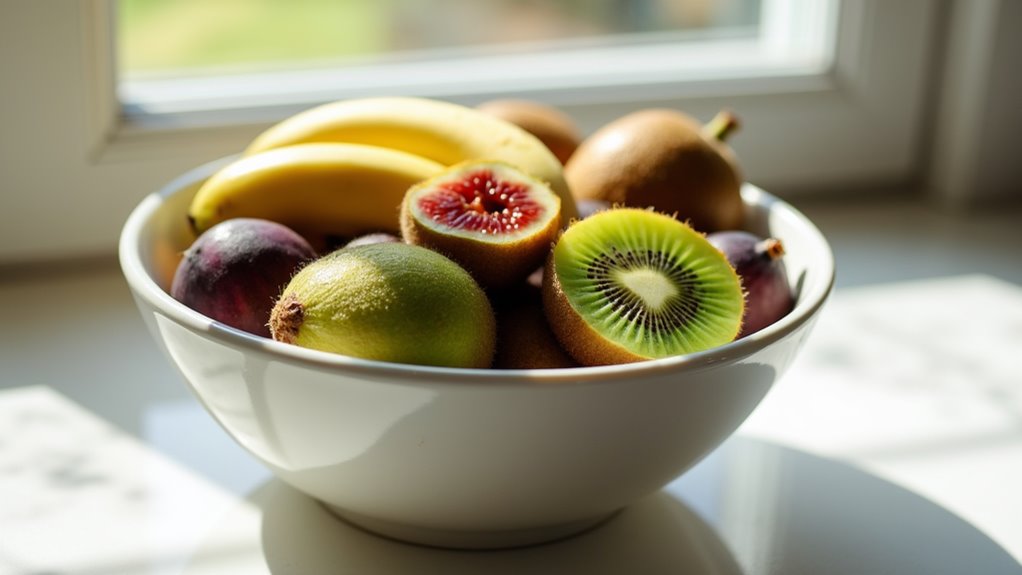Natural Help for When My Stomach Feels Off
When your stomach feels off, consider soothing herbal teas like chamomile or ginger to ease discomfort. Incorporating bland foods such as rice or bananas can help as well. Staying hydrated is key for digestion, so drink plenty of water. Probiotic-rich yogurt supports gut health, while avoiding spicy or fried foods can reduce irritation. Make sure to manage stress through relaxation techniques. Want to discover more natural solutions and lifestyle tips?
Understanding the Causes of an Upset Stomach
What causes that uncomfortable feeling in your stomach?
It can stem from various digestive issues like constipation or overeating. Indigestion can lead to discomfort and may present symptoms such as bloating or early fullness. Stress and certain medications, including antibiotics, may also play a role. Dietary factors, such as consuming spicy or rich foods, might irritate your stomach too. Many people find that incorporating fiber-rich foods into their diet can help alleviate constipation-related discomfort. If you’re dealing with constipation, integrating effective constipation remedies can ease your discomfort. Conditions like GERD or food allergies further complicate matters.
Soothing Teas for Gastrointestinal Relief
Soothing teas like spearmint help reduce pain and bloating, while chamomile offers relaxation and alleviates gas. Rooibos tea is a caffeine-free option that soothes your digestive system. Fennel tea relieves gas, and ginger mint tea combines peppermint’s soothing properties with ginger’s digestive support. In addition to these options, ginger-lemon tea is particularly effective at easing inflammation and promoting healthy digestion. To prepare, steep your chosen tea for 5 to 10 minutes in boiling water. Consider sweetening it with honey or lemon for added flavor. Regular consumption can significantly improve digestion and comfort, making it a simple remedy to incorporate.
Dietary Approaches to Ease Stomach Discomfort
Wondering how to alleviate that gnawing discomfort in your stomach? Start by opting for bland carbohydrates like rice and crackers, which are gentler on your digestive system. Drinking water may also be beneficial as it aids in efficient digestion and helps reduce the risk of an upset stomach. To help with rehydration, add clear fluids like clear broths to your regimen, as they can replace lost minerals during bouts of nausea. Avoid spicy or fried foods to reduce irritation. Lean proteins and steamed veggies can help maintain nutrition without aggravating symptoms. Consider the BRAT diet—bananas, rice, applesauce, and toast—for acute issues like diarrhea. Incorporate probiotic-rich foods such as yogurt, kefir, or sauerkraut to support gut health. And don’t forget to ease your intake; smaller meals can make a big difference in how you feel.
Hydration and Its Impact on Digestive Health
Staying adequately hydrated is crucial for smooth digestion and overall gut health. Water acts as a lubricant for food, aids in breaking down nutrients, and helps your body absorb essential vitamins and minerals. When you’re hydrated, your digestion operates more efficiently, preventing discomfort like bloating and constipation. Additionally, hydration supports efficient nutrient absorption from food, ensuring your body gets the essential components it needs for optimal health. Inadequate hydration can lead to constipation issues, making it essential to drink enough fluids throughout the day.
Importance of Adequate Hydration
Hydration plays a vital role in maintaining optimal digestive health, impacting everything from enzyme efficiency to gut motility.
When you’re adequately hydrated, digestive enzymes can effectively break down food, enhancing nutrient absorption. Conversely, dehydration slows down enzymatic reactions, leading to bloating and discomfort. It also affects gut motility, making waste removal less efficient and contributing to constipation. Additionally, proper hydration supports a balanced gut microbiome, vital for your overall health. Water serves as a lubricant to facilitate food movement through the digestive tract, further promoting digestive efficiency. To prevent digestive issues, keep an eye on your hydration status.
Light yellow urine is a good indicator that you’re drinking enough water. Stay hydrated for better digestive well-being!
Hydration’s Role in Digestion
Maintaining the right level of hydration is crucial for effective digestion. Water helps break down macronutrients and facilitates their absorption in your intestines.
When you’re properly hydrated, nutrient passage through intestinal walls becomes smoother, preventing deficiencies. Additionally, water acts as a lubricant, making food easier to swallow and promoting efficient movement through your digestive tract.
Inadequate hydration can lead to constipation and bloating, disrupting your digestive processes. Moreover, hydration supports your gut microbiome, enhancing overall gut health.
Herbal and Natural Supplements for Relief
When you’re looking for relief from an upset stomach, herbal blends can be a game changer. Peppermint is especially effective for soothing digestive discomfort, but it’s important to approach aloe vera with caution due to its potential side effects. Understanding how these natural supplements work can help you find the right solution for your needs. Incorporating remedies like ginger and peppermint can provide fast relief from bloating and belly discomfort.
Effective Herbal Blends
Herbal blends can provide effective relief for upset stomachs, combining nature’s best remedies to soothe digestive discomfort. Consider these blends that target specific issues:
| Blend Name | Key Ingredients | Benefits |
|---|---|---|
| Ginger & Meadowsweet | Ginger, Meadowsweet | Reduces cramping and indigestion |
| Chamomile Calm Blend | Chamomile | Alleviates nausea, promotes calm |
| Slippery Elm Soother | Slippery Elm, Ginger | Soothes the digestive tract |
| Agrimony Digestive Aid | Agrimony | Improves digestion, eases upset |
Experimenting with these blends could be your key to finding relief!
Peppermint for Relief
After exploring effective herbal blends for digestive discomfort, peppermint stands out as a powerful ally for relief.
Research shows that enteric-coated peppermint oil capsules can reduce IBS symptoms by 75%, significantly outpacing placebos in multiple trials.
This herb relaxes gut spasms and alleviates cramping through menthol’s action on intestinal muscle.
Optimal delivery via enteric-coated capsules ensures targeted effects, minimizing side effects like reflux.
Gastroenterologists often recommend it as a first-line natural therapy.
For best results, consider combining peppermint with dietary changes to tackle bloating and discomfort effectively while maintaining a focus on your individual symptoms.
Caution With Aloe Vera
While aloe vera has gained popularity for its potential to soothe digestive issues, it’s essential to approach its use with caution.
Although studies suggest it can relieve symptoms of GERD and IBS, scientific support remains limited.
Aloe’s laxative properties, caused by anthraquinones, may lead to cramps and aren’t safe for long-term use.
Overconsumption can trigger adverse reactions, especially for those with underlying conditions.
Always consult your healthcare provider before trying aloe vera, especially if you’re pregnant or breastfeeding.
Foods to Include When Your Stomach Is Upset
When your stomach’s upset, choosing the right foods can make a significant difference in how you feel.
Focus on these gentle options to help soothe your symptoms:
- Bananas: Easy to digest and packed with potassium.
- Rice: Stick to white rice for firming up the stool.
- Clear Broths: Hydrate and replenish electrolytes effectively.
- Ginger: It’s known for alleviating nausea and discomfort.
Incorporating these foods can’t only ease your discomfort but also provide necessary nutrients. Additionally, consider following a BRAT diet to support gentle digestion during recovery.
Always listen to your body, and if symptoms persist, consult a healthcare professional for guidance.
Lifestyle Modifications for Better Stomach Health
Making small lifestyle changes can have a big impact on your stomach health.
Prioritize stress management through mind-body exercises like yoga or meditation; these reduce stress’s detrimental effects on digestion.
Get moving with moderate exercise daily to enhance gut motility and alleviate discomfort.
Stay well-hydrated to aid digestion and prevent constipation, while minimizing sugary or caffeinated beverages.
Quit smoking and limit alcohol intake, as both can irritate your stomach and disrupt digestion.
Lastly, practice mindful eating by chewing slowly and managing portion sizes; this allows your body to digest food more efficiently and reduces bloating and discomfort. Incorporating gentle exercises like walking can further support digestive health and combat bloating.
Common Foods and Substances to Avoid
When you’re dealing with an upset stomach, certain foods and drinks can make matters worse.
You should steer clear of trigger foods like dairy and fried items, as well as irritating beverages like caffeinated drinks and sodas.
Heavy meals, particularly those rich in fats or sugars, can also contribute to discomfort, so consider lighter options. Additionally, being mindful of your eating habits, such as taking smaller bites and chewing thoroughly, can help reduce discomfort and prevent bloating.
Trigger Foods to Avoid
An upset stomach can derail your day, making it essential to identify and avoid certain trigger foods.
Paying attention to what you eat can help you feel better.
Here are four common culprits:
- Dairy products: They often cause issues if you’re lactose intolerant.
- Cruciferous vegetables: Foods like broccoli and cauliflower can be tough to digest.
- High-fat foods: Items like fried foods and fatty meats slow digestion, leading to discomfort.
- Gluten: Found in wheat and barley, gluten can aggravate those with sensitivities.
Steering clear of these can make all the difference in your stomach’s comfort!
Beverages That Irritate
Have you ever considered how much what you drink affects your stomach?
Carbonated beverages can cause bloating and heartburn by releasing gas in your digestive tract. Alcohol irritates the stomach lining and stimulates excess acid production, worsening gastritis symptoms. Energy drinks might trigger gastrointestinal irritation due to their high caffeine and other stimulating compounds. Acidic fruit juices, especially citrus, can provoke heartburn and stomach pain when consumed empty-stomach. Lastly, sugary and artificially sweetened drinks can lead to gas, bloating, and digestive upset.
Being mindful of these beverages can help you avoid unnecessary discomfort and maintain a happier stomach.
Heavy Meals Impact
Heavy meals can significantly impact your digestive health, leading to discomfort and distress.
To help avoid these issues, steer clear of:
- Fried and fatty foods – They delay digestion and cause lingering discomfort.
- Spicy foods – They can produce gas and exacerbate acid reflux.
- Large portion sizes – Eating too much stretches the stomach and impairs digestion.
- Alcohol – It weakens the lower esophageal sphincter, promoting acid reflux.
Being mindful of these foods can help you maintain a comfortable stomach and improve your overall digestive health after meals.
The Importance of Rest and Relaxation
Rest and relaxation play a crucial role in maintaining digestive health, helping to alleviate discomfort that often stems from stress. Stress reduces digestive efficiency and can lead to disorders like IBS. Engaging in relaxation techniques can activate your body’s “rest and digest” response, promoting better gut function and reducing inflammation.
| Benefits | Impact on Digestion |
|---|---|
| Stress Reduction | Mitigates negative gut effects |
| Improved Gut Health | Promotes balanced microbiota |
| Enhanced Pain Tolerance | Reduces discomfort and symptoms |
Incorporating practices like deep breathing and mindful eating helps support your digestive health significantly.
When to Seek Professional Help for Stomach Issues
Taking care of your digestive health is vital, but there are times when self-care isn’t enough.
Seek professional help if you experience:
-
Severe Pain: If you can’t move due to intense pain or have a fever over 100.4°F (38°C).
-
Dehydration Symptoms: Prolonged vomiting or diarrhea making it hard to keep liquids down.
-
Blood in Stool/Vomit: Any signs of active bleeding, like bright red stools or coffee-ground vomit.
-
Chronic Symptoms: Diarrhea lasting over two weeks or persistent heartburn happening three or more times weekly.
Being proactive can prevent serious complications!








